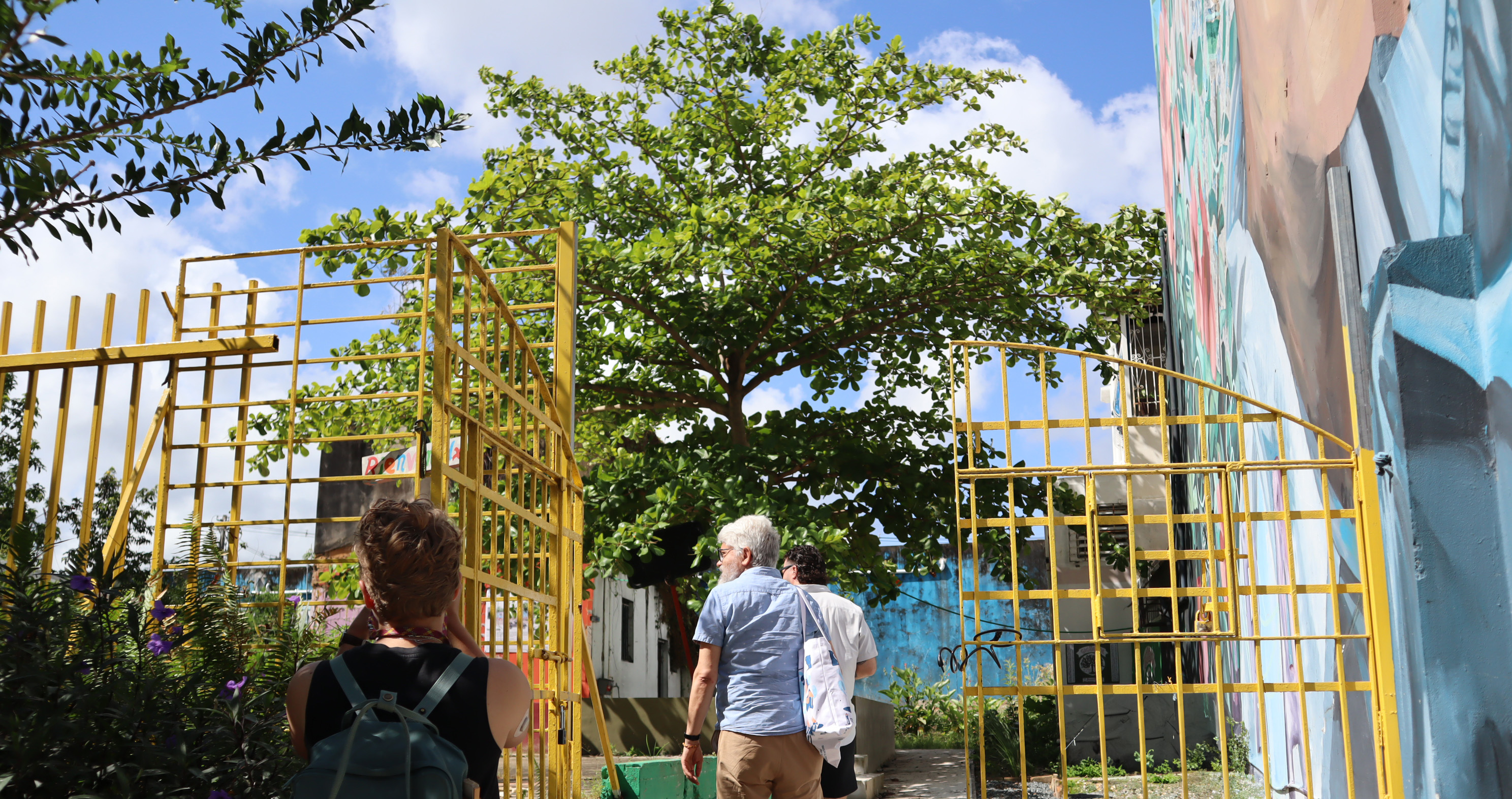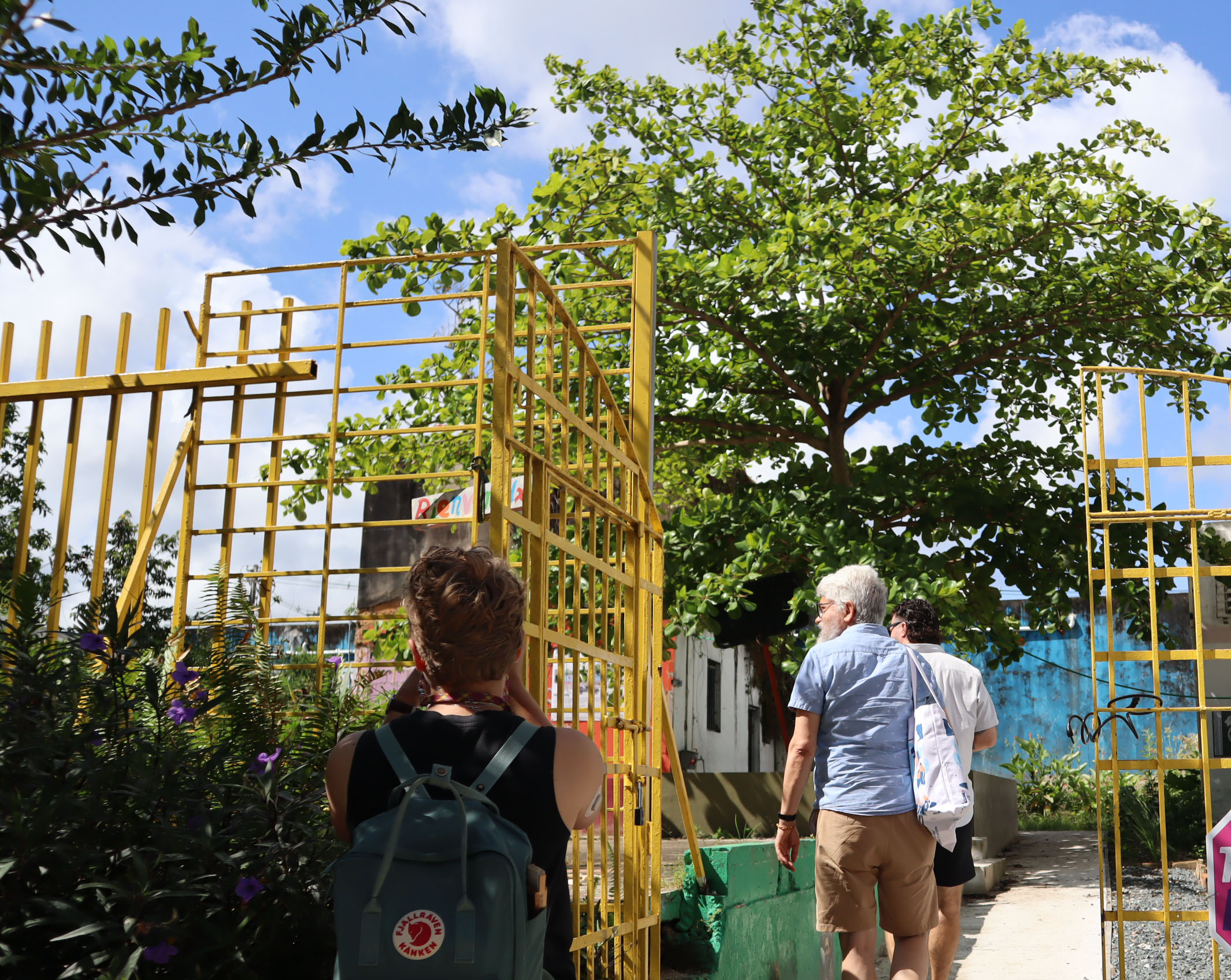"Creating an ecosystem of encounter"
MCC partner Urbe Apie revitalizes food and urban community spaces in Puerto Rico

In Caguas, Puerto Rico, Urbe Apie, an MCC partner, is restoring and nurturing local residents' relationships with food and urban community spaces. Huerto Feliz provides community members of all income levels a space to connect with nature and each other.
In Caguas, Puerto Rico, Urbe Apie, a partner of Mennonite Central Committee (MCC) East Coast, is restoring and nurturing local residents' relationships with food and urban community spaces.
Urbe Apie is a non-profit, community-based organization established in 2015 by residents of the Traditional Urban Center of Caguas. Their mission is to revitalize abandoned or disused spaces for social, cultural and economic development and well-being of urban communities. Their name roughly translates to "the city by foot," which embodies their commitment to community building.
Their MCC-supported community garden, called Huerto Feliz, serves as an urban oasis and a community hub. The garden was planted following the aftermath of Hurricane Maria.
Cultivating resilience and community
Hurricane Maria brought unprecedented devastation to Puerto Rico, with 80% of the island's crops destroyed, leading to significant food shortages.
The Hurricane also severely damaged Puerto Rico's economy and thousands of homes, prompting many residents to leave the island. In response, more interest was drawn to Act 60, which offers significant tax breaks and provides incentives for non-Puerto Ricans to move to the island. This law has been attracting wealthy outside investors to take advantage of the low tax rates. This growing number of outside investors are moving to Puerto Rico to buy residential properties and resell them at higher prices or convert them into short-term vacation rentals, driving the process of gentrification.
"Without plants, without food, there is nothing," says Zeuz Omar Ayala, co-founder and director of Urbe Apie.
"The garden was planted after Maria. We've only been here 7 years. So, what can you do in the community to stop gentrification and climate change? It's the same," says Ayala. The community garden gives people the opportunity to contribute and participate, which creates a more resilient community as they continue to face gentrification, recover from Hurricane Maria and deal with the ongoing impacts of climate change.
The changing climate brings increasingly frequent and intense hurricanes, extreme heatwaves and unpredictable weather patterns. People on the island experience loss, disruption and systemic injustice that exacerbate and exploit these vulnerable conditions.
Ayala says, "the reality is that climate change in Puerto Rico is conditioned by our colonial status."
From centuries of Spanish colonial rule to becoming a United States territory in 1898, Puerto Rico's local food system has suffered from the consequences of colonial practices and policies, such as monoculture farming.
The wave of gentrification in Puerto Rico, a consequence of Act 60, has deepened inequity on the island, driven up housing prices and pushed local residents out of their own neighborhoods. Consequently, the cost of living has dramatically increased on an island where 41.7% of the population lives below the federal poverty line. Caguas is one of the many urban communities facing these challenges.
In Caguas, Urbe Apie works towards a vision where urban communities are repopulated, vibrant and permanent, strengthened by and for the community through the sustainable use of spaces and resources. MCC supports their vision by providing grants to strengthen the impact of Urbe Apie's Huerto Feliz and secondhand clothing boutique.
Jean Carlos Arce, MCC East Coast program coordinator for Puerto Rico, says, "Urbe Apie is an organization that in many ways is living out Jesus's words in Matthew 25:35-36 by providing food, clothing and safe spaces for community members that live the realities of urban abandonment and a struggling economy."

Nourishing food, space and relationships
At Huerto Feliz, MCC's grants have resulted in the installation of a new roof, a pump for rainwater collection and a direct current (DC) solar system featuring solar panels and batteries, solar-powered lighting and a refrigerator powered by the DC solar system.
With these improvements to the community space, Huerto Feliz continues to provide community members of all income levels a space to connect with nature and each other. They also provide workshops for residents to learn how to grow nutritious food.
Despite the tropical climate that allows farmers to grow year-round, the island imports 85% of its food. Puerto Rico's current relationship with the U.S., along with policies such as the Jones Act, hinders Puerto Ricans' connection to their land, local food, agricultural traditions and livelihood.
Arce reflects, "It's been beautiful to see how our direct current (DC) solar project has created a space in the urban garden for strangers and neighbors alike to connect and continue to learn what it means to care for each other and the land -- all of God's creation.
Erid Roman Rosario, coordinator of Huerto Feliz, didn't know anything about growing food at first: "I started learning here with different friends that already grew different things. I started asking what they were and right now, I know almost everything around here."
"Right now, I'm part of a botanical team that focuses on endangered native plants," he says.
While the garden nourishes and brings the community together, Rosario has tasted its richness in his personal life as well. "I have eaten a lot of bananas and a lot of spinach and sweet potatoes. So, I have also benefitted out of it," he says.
The garden has also been a fruitful foundation for Rosario to connect with people in his community and beyond: "I have met a lot of people...that also has helped me to grow because I started expanding [my] knowledge and relationships."
Through Huerto Feliz and other projects, Urbe Apie is inspiring urban residents to reconnect with community spaces and sustainable food production. Rosario's dream for Huerto Feliz is to produce as many health and fresh foods as possible for the people and community, especially on an island where 85% of the food is imported.
Ayala reflects, "The most important thing about all these spaces is that they create an ecosystem of encounter. ...It creates a foundation for people to have hope or feel part of something."
MCC's commitment to creation care
Through partnerships with organizations like Urbe Apie, MCC is responding to the basic food and relational needs of people in Puerto Rico who face struggles caused by centuries of colonization and the growing intensity of the effects of climate change.
In all of our work, in Puerto Rico and beyond, MCC envisions communities worldwide in right relationship with God, one another and creation.
Ecological restoration at MCC's Welcoming Place campus in Akron, Pennsylvania aims to transition 70% of the entire campus to native plant species. As a result, staff, visitors and local community members alike are growing in awareness of biodiversity and native landscaping as a way to care for God's creation.
Around the world, MCC's partners work to support people in adapting to the challenges of climate change. In Rwanda, for example, MCC partner Peace and Development Network (PDN) is tackling food insecurity and climate challenges through conservation agriculture, which includes minimal tilling, mulching and crop rotation. These techniques restore soil health and increase crop yields for farmers and help communities find steadiness amid the uncertainty that climate change brings.
Climate change is making difficult situations even worse for people in urban areas and communities already made vulnerable due to gentrification and colonization. MCC encourages U.S. and Canadian supporters to take advocacy action to address the root causes of climate change through our Climate Action for Peace campaign. visit ClimateActionForPeace.com to learn more and take action.

